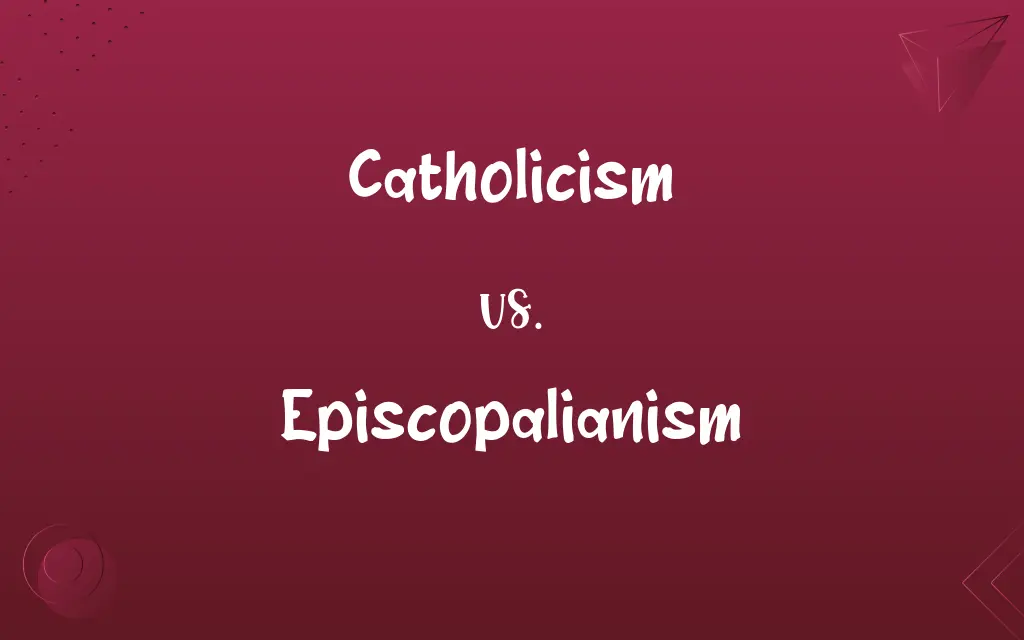Catholicism vs. Episcopalianism: Know the Difference

By Shumaila Saeed || Updated on December 25, 2023
Catholicism is the largest Christian church, led by the Pope, adhering to traditional doctrine and practices. Episcopalianism is a Protestant denomination originating from the Church of England, with autonomous leadership.

Key Differences
Catholicism is centered around the authority of the Pope and the Vatican, adhering to ancient traditions and doctrines. Episcopalianism, in contrast, has no central authority figure, focusing instead on a more democratic church governance.
Shumaila Saeed
Dec 21, 2023
In Catholicism, sacraments are considered essential for salvation and are strictly defined. Episcopalianism also values sacraments but interprets them with more flexibility and openness to modern ideas.
Shumaila Saeed
Dec 21, 2023
Catholicism emphasizes the Virgin Mary and saints, often invoking their intercession in prayers. Episcopalianism recognizes saints but does not emphasize their intercession in the same way, focusing more on the direct relationship with God.
Shumaila Saeed
Dec 21, 2023
Catholicism adheres to the doctrine of transubstantiation in the Eucharist, where the bread and wine are believed to become the body and blood of Christ. Episcopalianism views the Eucharist more symbolically, as a representation of Christ's body and blood.
Shumaila Saeed
Dec 21, 2023
Catholicism has a strong emphasis on papal infallibility when the Pope speaks ex cathedra on matters of faith and morals. Episcopalianism lacks this concept, promoting theological exploration and individual interpretation.
Shumaila Saeed
Dec 21, 2023
ADVERTISEMENT
Comparison Chart
Catholicism vs. EpiscopalianismLeadership
Led by the Pope
No central authority, more democratic
Shumaila Saeed
Dec 21, 2023
ADVERTISEMENT
Catholicism and Episcopalianism Definitions
Catholicism
A branch of Christianity centered around the teachings of the Roman Catholic Church.
In Catholicism, the Pope is seen as the spiritual successor to Saint Peter.
Shumaila Saeed
Dec 14, 2023
Episcopalianism
A religious group with a representative form of church government.
In Episcopalianism, bishops play a key role in church governance.
Shumaila Saeed
Dec 14, 2023
Catholicism
A belief system that upholds the teachings of Jesus Christ as interpreted by the Roman Catholic Church.
Catholicism's doctrines are based on the Bible and centuries of theological development.
Shumaila Saeed
Dec 14, 2023
Episcopalianism
A Protestant denomination with roots in the Church of England, emphasizing liturgical worship.
In Episcopalianism, the Book of Common Prayer guides the worship services.
Shumaila Saeed
Dec 14, 2023
Catholicism
A religious tradition emphasizing the sacraments, liturgy, and authority of the Pope.
Catholicism's rich history is evident in its ancient cathedrals and art.
Shumaila Saeed
Dec 14, 2023
ADVERTISEMENT
Episcopalianism
A denomination valuing inclusivity, social justice, and theological diversity.
Episcopalianism is often at the forefront of social justice initiatives.
Shumaila Saeed
Dec 14, 2023
Catholicism
A faith system with a strong focus on community, tradition, and hierarchical structure.
Catholicism plays a significant role in many cultural and community events.
Shumaila Saeed
Dec 14, 2023
Episcopalianism
A Christian tradition known for its blend of liturgy, scripture, reason, and tradition.
Episcopalianism encourages open discussion and interpretation of scripture.
Shumaila Saeed
Dec 14, 2023
Catholicism
A Christian denomination known for its universal approach and global presence.
Catholicism has a worldwide following, with churches in nearly every country.
Shumaila Saeed
Dec 14, 2023
Episcopalianism
A branch of Christianity focusing on the middle way, between Catholic and Protestant traditions.
Episcopalianism is sometimes referred to as the 'via media' or middle way in Christian theology.
Shumaila Saeed
Dec 14, 2023
Catholicism
The faith, doctrine, system, and practice of a Catholic church, especially the Roman Catholic Church.
Shumaila Saeed
Dec 13, 2023
Catholicism
The state or quality of being catholic or universal; catholicity.
Shumaila Saeed
Dec 13, 2023
Catholicism
The state or quality of being catholic or universal; catholicity.
Shumaila Saeed
Dec 13, 2023
Catholicism
The faith of the whole orthodox Christian church, or adherence thereto.
Shumaila Saeed
Dec 13, 2023
Catholicism
The doctrines or faith of the Roman Catholic church, or adherence thereto.
Shumaila Saeed
Dec 13, 2023
Repeatedly Asked Queries
Do both Catholicism and Episcopalianism honor Mary and the saints?
Both honor them, but Catholicism places more emphasis on their intercession.
Shumaila Saeed
Dec 21, 2023
What is the central figure in Catholicism?
The Pope is the central figure in Catholicism, considered the spiritual successor of Saint Peter.
Shumaila Saeed
Dec 21, 2023
How does Episcopalianism view church authority?
Episcopalianism has a more democratic approach, with no central authority like the Pope.
Shumaila Saeed
Dec 21, 2023
Are the sacraments important in both traditions?
Yes, but Catholicism views them as essential to salvation, while Episcopalianism is more flexible.
Shumaila Saeed
Dec 21, 2023
How do the two denominations view the Eucharist?
Catholicism believes in transubstantiation, while Episcopalianism sees it as symbolic.
Shumaila Saeed
Dec 21, 2023
How does Catholicism view scripture and tradition?
Catholicism places equal emphasis on scripture and tradition for doctrine.
Shumaila Saeed
Dec 21, 2023
Are social justice issues a focus in both denominations?
Both address social issues, but Episcopalianism is particularly known for its active stance.
Shumaila Saeed
Dec 21, 2023
What is the Catholic view on salvation?
Catholicism sees salvation as a process involving faith, good works, and sacraments.
Shumaila Saeed
Dec 21, 2023
How does Episcopalianism interpret the Bible?
Episcopalianism encourages personal interpretation and reasoning in understanding the Bible.
Shumaila Saeed
Dec 21, 2023
What distinguishes the worship style in Episcopalianism?
Episcopalianism is known for its structured liturgy and use of the Book of Common Prayer.
Shumaila Saeed
Dec 21, 2023
Do both have a global presence?
Yes, both Catholicism and Episcopalianism have followers worldwide.
Shumaila Saeed
Dec 21, 2023
What is the Catholic approach to liturgy?
Catholicism has a highly structured and traditional approach to liturgy.
Shumaila Saeed
Dec 21, 2023
What is the role of bishops in Episcopalianism?
Bishops play a key role in governance and spiritual oversight in Episcopalianism.
Shumaila Saeed
Dec 21, 2023
How does Episcopalianism view inclusivity?
Episcopalianism is known for its inclusive approach to gender, sexuality, and race.
Shumaila Saeed
Dec 21, 2023
What's the Catholic stance on the priesthood?
Catholicism requires celibacy for its priests and does not ordain women.
Shumaila Saeed
Dec 21, 2023
Is papal infallibility a concept in both?
No, it's unique to Catholicism and not present in Episcopalianism.
Shumaila Saeed
Dec 21, 2023
How do the two denominations handle theological development?
Catholicism adheres to traditional doctrines, while Episcopalianism is more open to modern ideas.
Shumaila Saeed
Dec 21, 2023
Is the Bible interpreted differently in Catholicism and Episcopalianism?
Yes, Catholicism often interprets it through the lens of tradition, while Episcopalianism encourages individual reasoning.
Shumaila Saeed
Dec 21, 2023
How does Episcopalianism approach the priesthood?
Episcopalianism allows married and female priests.
Shumaila Saeed
Dec 21, 2023
What are the educational institutions like in both denominations?
Both have strong educational systems, with Catholicism known for its large number of schools and universities, and Episcopalianism for its emphasis on critical thinking and inclusivity.
Shumaila Saeed
Dec 21, 2023
Share this page
Link for your blog / website
HTML
Link to share via messenger
About Author
Written by
Shumaila SaeedShumaila Saeed, an expert content creator with 6 years of experience, specializes in distilling complex topics into easily digestible comparisons, shining a light on the nuances that both inform and educate readers with clarity and accuracy.








































































